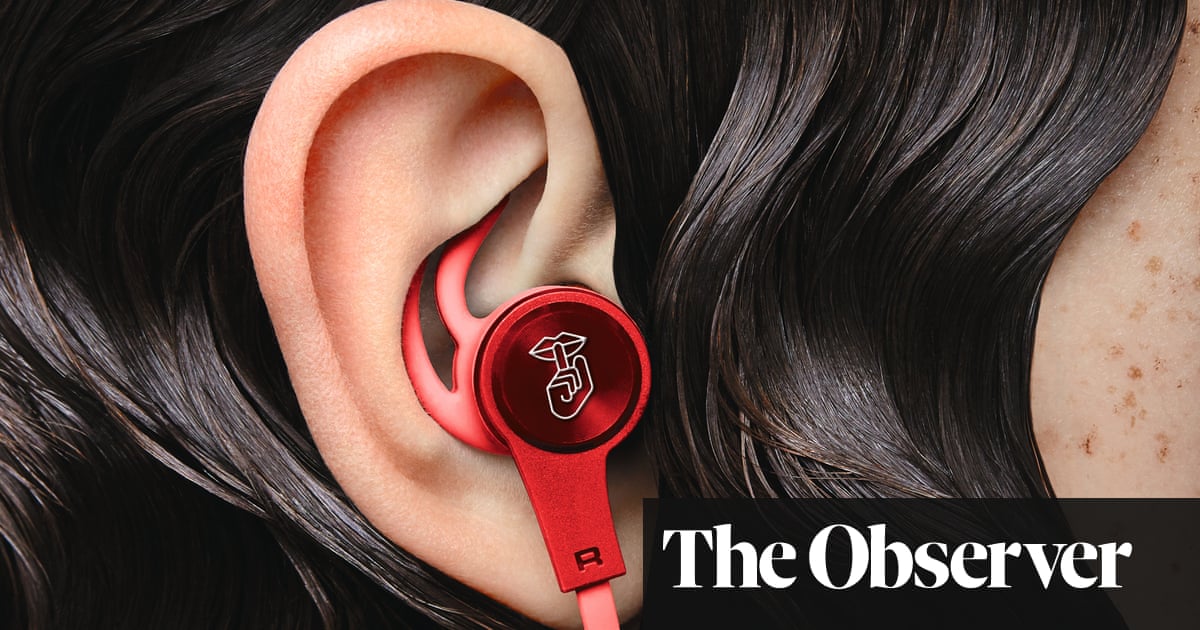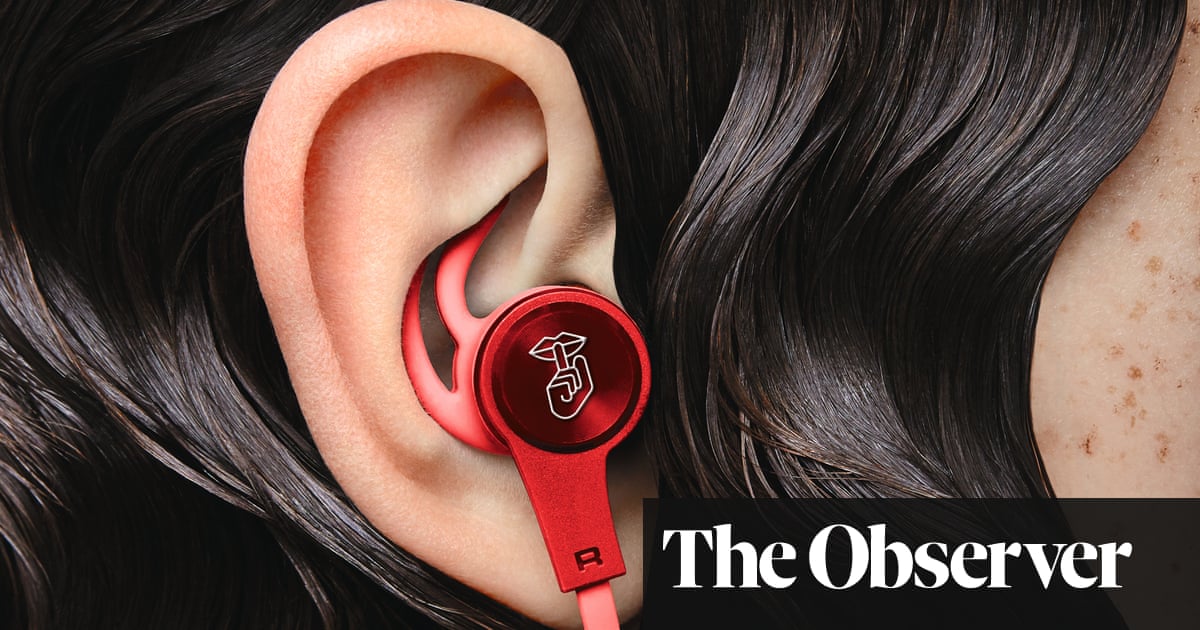Pinging mobiles, sniffling passengers, desk diners The incessant noise of modern life never stops and its infuriating Emma Beddington. So whats the best way to find some peace and turn down the volume?

Ten years ago, I bought a box of earplugs. My partner occasionally snored and, at about 12 for 200 pairs, it seemed an absolute bargain. That was more than enough for a lifetime of peace, surely? I ran my hand through the slippery packets of foam slugs; they were yellow and pink, like rhubarb and custard sweets. I felt like an earplug millionaire.
The last time I put my hand in the box, I hit cardboard: a lifetimes supply of earplugs, nearly gone. There are rhubarb and custards under my pillow and in my handbag, in the pockets of every coat I own, in our vacuum cleaner, even stuck to my back as I blearily shower in the morning. I measure out my life in rhubarb and custard earplugs.
My name is Emma and I have become a noise bore: a shusher, a tutter and a wordless fulminator. I Google abandoned croft, Hebrides regularly and spent months researching noise-cancelling headphones. I seriously considered trading my rhubarb and custards in for a 300 pair: 300 for earplugs! Barely a week goes by without me quoting the Road Traffic (Vehicle Emissions) Regulations 2002 at a driver with an idling engine, and I email Ian, the local council noise enforcement officer, more often than I email my sister.
Ive been noise-sensitive for years. Maybe the seeds were sown in my first year at university, a stressful time, filled with harrowing sex noises and the Prodigy from the room next door as I tried to work or sleep. It might go back further: I went to a Quaker school with daily sessions of silent meeting for worship, which left me with an eerie ability to sit completely still for hours and a craving for calm.

Nevertheless, I lived mainly unbothered by noise for 12 years in a quiet Belgian suburb and when we moved back to the UK in 2018, to a more urban location, I wasnt worried. How noisy could a genteel provincial city be? Pretty noisy, I realised, with a sinking feeling, as we sat in our empty house the first evening after collecting the keys, listening to an unmistakable hen party soundscape of cackling and Beyonc. Our street is full of restaurants; its also the main route for students to and from campus. Then there are the rubbish collections: the thump-thud of late-night wheelie bins, dawn lorries with bleeping sensors and the soul-wracking cacophony of containers of glass being emptied. When the sleepy pub opposite put up a sign declaring it was now a Polish Vodka Karaoke Bar it seemed like bad news, and indeed, it was. That was when the earplug reserve started to drain alarmingly.
Dont move to a city centre if you cant hack noise, you may think, quite rightly. Im sure thats what Ian thinks every time I send him a 5am video of a reversing bin lorry. But these arent (just) the ravings of an angry, middle-aged woman. I have become increasingly aware of how far from alone I am in my obsession. Im part of a huge community of people who want everything to just pipe down.
Its not new. London noise inspired an 1856 editorial in the Times bemoaning the noisy, dizzy, scatterbrained atmosphere. Nineteenth-century historian Thomas Carlyle was famously infuriated by noise at his home in Chelsea, including crowing cockerels and an organ grinder. The question arises whether to go out and if not assassinate him, call the Police upon him.
National Trust founder Octavia Hill wrote passionately in the 1880s of the universal need for silence, space and air, allowing that sense of quiet which whispers of better things come to us gently.
But that sense of quiet seems impossible to achieve now. We live in high-density housing in urban centres, where we are prey to sirens, engines and extractor fans. We travel on trains and buses at the mercy of other peoples digestion, openly broadcasted music (sodcasting) and phone calls. We work in open-plan spaces, sitting shoulder-to-shoulder with coughers, pen tappers, desk diners and obnoxious conference callers.
Actual loud noise is unequivocally bad for us. A World Health Organization report in 2011 estimated that in Western Europe alone, traffic noise results in the annual loss of at least one million healthy years of life. Reliable statistics on noise-induced hearing loss are hard to come by, but a 2011-12 study by the US Centers for Disease Control and Prevention estimated that between 6% and 24% of American adults under 70 suffer.

But the noises that most upset me are not physically harmful. They are the day-to-day aural annoyances that loom disproportionately large. I work in a library most days and Im maddened by leaking headphones (I know one regular only as Opera Menace), people whose computers and phones have audible alerts, and what I think of as mainframe hackers typists who bash hectically at their keyboards like hackers in 90s movies. Calm down, Alan, youre requesting a parking permit, not infiltrating the Pentagon. These ordinary sounds leave me impotently furious and unable to concentrate. A Twitter query revealed a chest-tightening list of noises that drive people to distraction and rage. Audible keytones topped the list, followed by sniffing, whistlers and bus eaters.
Adverse reactions to these noises can be clinical. In misophonia, ordinary noises such as breathing, chewing or finger tapping trigger strong feelings of anger or upset. My friend Arianna is a sufferer. It causes serious problems. My mum was here recently and I absolutely freaked out when she was trying to open a particularly crinkly bag of crisps. The rage just flew out of me and I yanked the bag out of her hands. Another poor sufferer tells me she couldnt even cope with the noise of goldfish picking up the gravel in their tank.
Misophonia involves both neurological and physiological symptoms. In a study led by Dr Sukhbinder Kumar, a neuroscientist at Newcastle University, misophonia sufferers who were played trigger sounds showed abnormally high levels of activity in the anterior insular cortex (AI), a part of the brain that is involved in both processing emotion and the salience network whether and how your attention is directed to something in your environment.
The AI is also highly connected to the default mode network the region of the brain involved with memory and recall. When people with misophonia were listening to trigger sounds their past experiences, their past memories, were also affecting the way their AI was responding, explains Dr Kumar. (Im speaking on the phone to him from my stepfathers attic in the hope of quiet, but inevitably, his neighbours have the builders in.) Sufferers also showed increased skin conductance and heart rate classic fight or flight responses, Dr Kumar explains (as the builders next door throw a chest freezer down the stairs and duel with pneumatic drills). The control group did not. We were surprised by how clear the results were, says Kumar.
I dont know if I actually have misophonia there are no accepted diagnostic criteria for the disorder yet but research indicates that 20-40% of the population have a degree of noise sensitivity. Noise-sensitive individuals are more likely to report symptoms of inadequacy, depression, anxiety, sensitivity, anger, tension, inferiority and nervousness, says the same research, describing what I fear is now my whole personality.
What help is there for the noise-sensitive? Ever obliging, end-stage capitalism has commoditised silence Uber Blacks silent driver option is just the creepiest manifestation. Silent retreats are the old-new mind hack for Hollywood and Silicone Valley A-listers, from Lupita Nyongo to Twitters Jack Dorsey. There are even silent spas in Austria and Estonia.

Then theres active noise cancelling (ANC) technology, one of the great technology success stories of the past decade. ANC headphones produce sound waves that mirror ambient background sounds to cancel them out and we cant get enough of them the global market is expected to reach more than $9bn by 2024.
Mine (I got them after a particularly cursed week adjacent to Opera Menace) emit a triumphant chime when you turn them on, as if to say, Youre saved! Its like entering a luxurious cocoon your head has been admitted to a thick-carpeted VIP room. I dont actually like the feeling and while they help hugely with general background noise, I find them useless against the worst mainframe hackers or that bloody whistling text alert.
Can therapy help? Clinical psychologist Dr Phil Lurie treats misophonia sufferers of all ages. He believes there is an important psychological component to strong adverse reactions to noise, partly stemming from a belief that it is transgressing a social rule. Youre saying: That person is making a noise and thats rude, and it makes you angry. I nod violently as he says this my affronted belief that noisemakers are disregarding the social contract definitely intensifies my reactions.
Dr Lurie explains you cant treat anger responses to noise with exposure as you would anxiety. We dont habituate to anger in the same way we do to anxiety thats not how anger works. We need to release that tension. He counsels relaxation and mindfulness exercises before situations that may involve trigger noises, and trying to get rid of tiredness, stress, anything that makes it more difficult to manage difficult situations. That chimes with Ariannas observation that stress exacerbates her misophonia: When Im on edge my perceptions and senses are heightened and all my triggers seem to just leap out at me.
Does Dr Lurie have coping strategies for preventing my library fury? Compassion really works feeling sorry for the people making the noise. Relaxation. Humour is a great antidote to anger, doing something fun.

Its easy to test. Within 10 minutes of my arrival in the library that day, a man starts typing so violently our shared table shakes. I feel my jaw tense. Compassion, I think, empathy. Maybe hes anxious? I stare at him I know hes not doing it deliberately, but I still hate him. Compassion eludes me. I put on my headphones, but the clacking is still audible, so I give up and go and work in a caf. Its noisy, but at least that noise doesnt transgress my rigid library etiquette code.
The next day, another man reads happily, as his phone bleeps and chirrups. Can I really be compassionate about this? Isnt it, objectively, the behaviour of a monster? Lightheaded with rage, my knuckles whiten. I imagine smashing the phone to pieces, chewing the glassy shards then spitting them out on to his copy of Railways of England. Instead I turn to my greatest solace: my best friend and our ever-open chat window. In recent years we have shared a catalogue of co-working crime reports. I am really struggling to show compassion, I type.
Guillotine him, she replies, instantly. Guillotine his face off. This makes me snigger. FACE GUILLOTINE she types again and I feel the tension ebbing out of me. Dr Lurie was right humour does help.
So now when it happens, I try to visualise a wave of compassion rolling out from my soul and enveloping (not drowning, honestly) my noisy fellow workers. When that fails, I deploy headphones. And in extremis, I sometimes allow myself to mentally face guillotine the offenders. Laugh, muffle or guillotine coping strategies are key, because noise is inescapable. However far you go, however much you pay, nowhere is truly silent.
After a year of bin lorries and emails to Ian, I took my husband to an isolated Lake District hotel for a birthday treat, hoping for a weekends peace. As we put our bag down on the bed in this cosseted bubble of rural calm, the sound of riotous laughter and music came, clear as day, from the next room. We looked at each other, then headed wearily to reception. They moved us, but the second night in a new room brought a symphony of shamingly vigorous 3am shagging. Life is noise. Even I dont want to cancel that.


Recent Comments